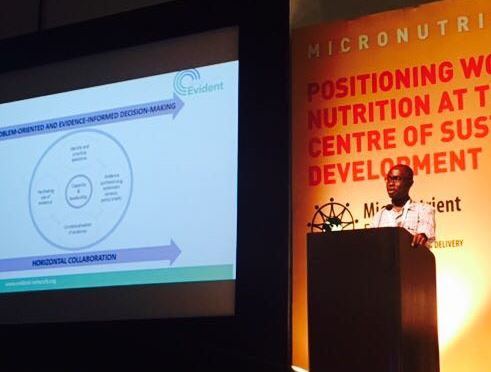Stakeholder Engagement: An Important Tool to Understanding and Improving Program Decision-Making
In 2012, SUNRAY an initiative to identify nutrition research priorities in sub-Saharan Africa, identified a number of research gaps: donors, rather than policy-makers and implementers drove research activities; research was not adequately linked to local priorities; and there was a substantial amount of research waste. These findings led to the formation of EVIDENT, a north-south partnership created to strengthen capacities to address the disparity between research and local needs in nutrition and health in Africa.
In pursuit of EVIDENT’s goals, 4 case studies were set up across Africa with Dr Richmond Aryeetey co-leading a team in Ghana with Dr Esi Colecraft from the University of Ghana. The Research Team aimed to understand the process of priority setting and decision-making in nutrition, and to identify the barriers and limitations for evidence utilization in this process. To this end, they sought to engage relevant stakeholders as a source of in-depth information about current nutrition programing.
Stakeholders are individuals who are directly affected by or have an effect on the actions of an organization. Stakeholder engagement has been proposed as a method to help realign research with the needs of policymakers, implementers, and the local community; engaging stakeholders can improve the relevance, transparency and adoption of implementation research. In this instance, key stakeholders were identified by asking statutory government agencies working on nutrition (e.g. Ghana Health Service, Ministry of Trade and Industry) and other partners (e.g. UN agencies, academia, civil societies) to nominate their most relevant representatives to participate in the case study.
Data collection was guided by the ‘Net-Map’ research tool, produced by IFPRI. This innovative empirical methodology combines social network analysis with a power-mapping tool. ‘Net-Map’ provides qualitative and quantitative data on interactions within the network (in this case the nutrition program), goals of stakeholders, and their power and influence.
Using a participatory approach, the Research Team facilitated two stakeholder workgroup meetings and 16 key informant interviews. Data collected from the first stakeholder workgroup meeting were analyzed and used to draft the stakeholder influence map for a specific nutrition program, as an example of a typical nutrition program in Ghana. The second stakeholder workgroup meeting was a validation workshop where findings from the key informant interviews and the draft stakeholder map were shared with stakeholders for their input.
Preliminary findings of stakeholder engagement suggest:
- Nutrition priorities are largely driven by external influences
- There is limited engagement between academia and decision making bodies, but interest to strengthen engagement
- Research agendas are not influenced by decision-making evidence need
- Ad hoc committees provide local contextual evidence
- Decision making rarely employs a comprehensive evidence review or contextualization to local political, economic, social, technological conditions.
Moving forward, stakeholders identified four key actions to strengthen decision-making capacity in nutrition across African countries. These were collaborative development of a nutrition research agenda in Ghana; development of a research registry led by EVIDENT; promotion of greater involvement of implementing agencies in research conceptualization; and conduct of systematic reviews leading to policy briefs targeted at implementing agencies.
Reflecting on these results Dr Aryeetey and his team concluded that “Our study demonstrates the value of stakeholder engagement to help identify and understand key issues in nutrition programming. These findings suggest that the observed research gaps are not simply know-do gaps; highlighting that first and foremost we need a framework to guide how to bring researchers and implementers together, so that decision-making is informed by research and vice versa. We welcome any initiatives that promote this agenda”.
Additional Resources: Stakeholder Engagement Research Tools
- Schiffer E, Waale D (2008) IFPRI discussion paper 00772 Tracing Power and Influence in Networks: Net-Map as a Tool for Research and Strategic Network Planning Available at: http://ebrary.ifpri.org/cdm/ref/collection/p15738coll2/id/10491
- Community Tool Box (2016) Tools to Change our World. In: Work Group for Community Health and Development, ed.Section 8. Identifying and Analyzing Stakeholders and Their Interests. Kansas: University of Kansas; Available At: http://ctb.ku.edu/en/table-of-contents/participation/encouraging-involvement/identify-stakeholders/main.)
- Mind Mapping Available at:http://www.mindmapping.com
This case study was presented during the Plenary Session “Implementation Science in nutrition: purposes, forms, functions and country examples” at the Micronutrient Forum (MNF) Global Conference in Cancun, Mexico in October 2016. For the full case study click here.
Have an idea or a comment on any of the issues discussed above? We welcome your feedback – you can comment on this post on our LinkedIn feed or write to us using the email address below.
If you are interested in finding out more about implementation science (IS) or becoming a member of SISN to help us advance the use of IS in nutrition, you can contact us via our website (www.implementnutrition.org) or can email us at implementnutrition@gmail.com.

